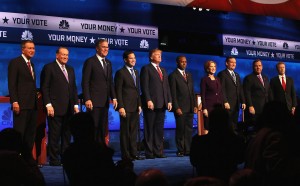The Third Republican Debate: Fighting, Flat Taxes, and Faith
 Screengrab via CNBC
Screengrab via CNBC Call me naïve, but after the first Democratic debate, I figured that Republicans would follow the example of their liberal colleagues and tone down the personal attacks. After all, Democrats were able to have an entertaining debate that focused on the issues without going after each other’s looks, personalities, or personal histories. The Democrats appeared professional and dignified, even when they disagreed with each other (with the exception of former Senator Jim Webb and his crazy eyes). Wouldn’t the Republicans want to promote a similar image—that of professional candidates for the presidency, albeit while arguing from a different political perspective?
Apparently, the answer is no. The candidates didn’t wait long to start striking at each other, with Donald Trump making fun of the low polling numbers of other candidates such as Ohio Gov. John Kasich; former Gov. Jeb Bush attacking Senator Marco Rubio’s work ethic; and almost all of the candidates attacking the CNBC moderators for their apparent “bias” or for not giving enough time for all candidates to speak.
While the personal attacks were disappointing and unproductive, they weren’t the worst part of the debate. The true low point came when the candidates started discussing some of their policies, many of which seem to be founded in outdated Christian philosophy.
Take for example Dr. Ben Carson, who stated that his flat tax plan was based off of the idea of “tithing,” or of giving a certain percentage of a person’s income, usually 10 to 15 percent, to a local church. When Carson was called out on this idea by the moderators, who claimed that it would only allow the government to collect 40 percent of the revenue it currently receives and would thus require a corresponding cut in the important services that the government currently provides, Carson brushed the criticisms off, encouraging people to just trust him as the numbers would all work out. This religiously inspired tax plan and the idea that the American people should just “have faith” that it will work, is extremely troubling, especially since Carson has a good chance of winning the Republican nomination.
And when Senator Ted Cruz was asked how he would improve the plight of women in the workforce and help single working moms, Cruz instead focused on how his father was “born again” and came back to his family so that his mom wouldn’t have to raise the children by herself. The Senator said nothing about ending pay inequality or about guaranteeing maternity leave for new mothers. Instead, Cruz’s plan apparently is for “broken families” to be healed by Christianity so there are no more single working mothers.
Sadly, it seems as though many of the Republican candidates for the presidency are more focused on attacking each other and burnishing their religious credentials than they are with actually proposing policies that can help America and its people succeed in the future. That’s a bad sign for American democracy because our system is based upon the idea of two serious political parties working together towards consensus on public policy and compromising in order to do what’s best for the country. If this proud political tradition is replaced by a situation in which one party is concerned with governing while the other party focuses on petty squabbles and theological debates, our country will suffer, and more and more Americans will become disenchanted with our system of government.
